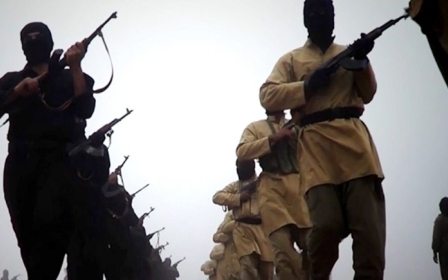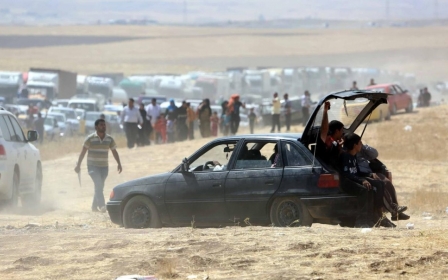Islamic State caliphate a 'declaration of war on al-Qaeda'

The declaration of a caliphate by the Islamic State of Iraq and the Levant (ISIL), who have renamed themselves the “Islamic State”, is a declaration of war on al-Qaeda and could spark a major shakeup of the global jihadist movement, according to analysts of radical militant groups in the Middle East.
The Islamic State (IS), as it is now known, announced on Sunday the establishment of a caliphate, an Islamic form of government last seen under the Ottoman Empire, extending across territory under their control from Aleppo in northern Syria to Diyala in Iraq.
The group said their mysterious leader Abu Bakr al-Baghdadi is to be the state’s emir, declaring that Muslims across the world are obliged to give their support to him and recognise the validity of their Islamic State.
“He [Baghdadi] is the imam and khalifah [caliphate leader] for the Muslims everywhere,” the group announced in a statement published online. “Accordingly the ‘Iraq and Sham’ in the name of the Islamic State is henceforth removed from all official deliberations and communications, and the official name is the Islamic State from the date of this declaration.”
“We clarify to the Muslims that with this declaration of khalifah, it is incumbent upon all Muslims to pledge allegiance to the khalifah Ibrahim [Baghdadi] and support him,” the statement added.
The group has significantly gained in prominence over the past three weeks, with many reports attributing them with playing a leading role in seizing large swathes of land in Iraq. Since capturing the country’s second largest city of Mosul on 10 June, armed Sunni groups including IS have taken control of a number of towns in the north and east of Iraq.
The group’s name change suggests their plans have expanded in nature, with the organisation stating all nation-states it encounters are no longer valid.
“The legality of all emirates, groups, states, and organisations, becomes null by the expansion of the khalifah’s authority and arrival of its troops to their areas,” their statement said.
Under their previous name the group seemingly sought to establish a state encompassing Iraq and the countries that make up the Levant, which includes Syria, Lebanon, Jordan and Palestine. Now, they appear to have expanded their desires to take in all areas where there is a significant population of Muslims.
“It’s important that they have dropped Iraq and the Levant from their name, as this further emphasizes their distance from Arab nationalism and desire to reinstall an Islamic caliphate encompassing the whole Muslim world,” said Pieter Van Ostaeyen, a Belgian specialist in Islamic and Arabic studies. “ISIL have reportedly put in place an emir for Lebanon, which would demonstrate what is already widely known that they seek to expand their influence beyond Iraq and Syria,” he added.
There have been unconfirmed reports on Lebanese television channel LBCI that IS militant Abdul Salam al-Ordoni has been appointed as the group’s leader in Lebanon and was behind a suicide attack on the Duroy Hotel in Beirut last week that injured a dozen people.
While there have been whispers of IS engagement in countries beyond Iraq and Syria, some analysts say their announcement of a caliphate has a different purpose other than expanding their operations.
“It is an attempt to consolidate their authority over the territory they have taken control of by adding a degree of legitimacy and credibility to their rule, which is what makes this an important development,” said Carool Kersten, senior lecturer in the Study of Islam and the Muslim World at King’s College London. “They [IS] are going to very quickly suffer imperial overstretch in the sense that it’s going to be quite a challenge to maintain power over the territories they have taken.”
“Declaring a caliphate will not do very much to establish control on the ground,” he added.
Kerston suggests it will be key to evaluate how groups fighting alongside IS in Iraq will respond to the statement, where there have been reports of Baathists playing a vital role in the Sunni offensive against government forces.
“It’s going to be interesting to see how former elements of Saddam Hussein’s regime, who are definitely part of the alliance that has taken control of the Sunni majority areas in Iraq, respond to this,” he said. “Until we have had some reaction in that regard I think it’s going to be too early to gauge what the exact impact of this announcement is.”
“The biggest effect could be on al-Qaeda, however, as this announcement will probably have the most resonance among likeminded organisations to IS,” he added.
The leader of al-Qaeda, Ayman al-Zawahiri, has previously disavowed what was then known as ISIL, denying reports the group was a branch of his organisation. Zawahiri rejected an attempt by ISIL last May to merge with Syrian al-Qaeda affiliate Jabhat al-Nusra and fighting has been fierce between the groups in Syria.
Analysts say this announcement could lead to increased conflict among these militant groups, with IS attempting to take a dominate role.
“This announcement [by IS] poses a huge threat to al-Qaeda and its long-time position of leadership of the international jihadist cause,” said Charles Lister, a visiting fellow at the Brookings Doha Centre. “Once the dust has settled, we will very likely find ourselves in a dualistic position of having two competing international jihadist representatives – al-Qaeda, with a now more locally-focused and gradual approach to success; and the Islamic State, with a hunger for rapid results and total hostility for competition.”
“The official media accounts of Jabhat al-Nusra have been unusually quiet…which would tend to suggest something significant is underway within its central leadership,” he added.
A report by the British based Syrian Observatory for Human Rights said Jabhat al-Nusra had merged with IS last week, although this was swiftly denied by members of the group on social media. There is, however, potential support among al-Qaeda members for the approach IS has taken to establishing a caliphate, according to some observers.
“There are definitely some cadres involved with al-Qaeda’s branches in the Arabian Peninsula and in northern Africa who have sympathies for ISIL and the caliphate they declared,” said Yassin Musharbash, a journalist and Arabic language specialist in Germany. “Given the advances of ISIL and the pull effect a declaration of a caliphate may have, I would not rule out that quite a few even high ranking members of al-Qaeda may see this as a more promising way and pledge allegiance to Abu Bakr al-Baghdadi.”
“The declaration of a caliphate is a show of confidence and resolve more than a demonstration of real power,” he added.
While attempting to consolidate control of their newly won territory in Iraq, the suggestion is that IS may now have to contend with rivalry among their fellow jihadist groups, although Kerston of King’s College says IS are playing a politically astute game.
“It is not inconceivable that we are going to see a power struggle between radicalised organisations while witnessing some support for IS’s caliphate among organisations that have been calling for this over a much longer period of time such as Hizb ut-Tahrir,” he said.
“IS is sort of outmanoeuvring these kind of organisations, they are politicians and power is an issue, so we may see quite a bit of infighting emerging from this announcement.”
Stay informed with MEE's newsletters
Sign up to get the latest alerts, insights and analysis, starting with Turkey Unpacked
Middle East Eye delivers independent and unrivalled coverage and analysis of the Middle East, North Africa and beyond. To learn more about republishing this content and the associated fees, please fill out this form. More about MEE can be found here.




